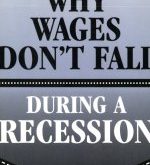.[embedded content]
Read More »Svensk skola av idag
Svensk skola av idag
Read More »Wage rigidity theories
It seems reasonable to hope that a successful explanation of wage rigidity would contribute to understanding the extent of the welfare loss associated with unemployment and what can be done to reduce it … Many theories of wage rigidity and unemployment include partial answers to these questions as part of their assumptions, so that the phenomena of real interest are described in the theories’ assumptions. For instance, Lucas concludes that increased unemployment during...
Read More »Don’t be trapped by dogma!
Don’t be trapped by dogma! [embedded content] This one is for all my students. Never give in. Never give up.
Read More »How economics has become a religion
How economics has become a religion Economics today has — as we all know — become a “the model is the message” discipline. But as long as it does not seriously argue and assess the compatibility of those models and their real-world target systems, the belief that those models in any essential way enhance our possibilities to understand or explain what happens in our economies, is a belief for which there really is no other ground than belief itself. Even if...
Read More »To Thee We Sing
To Thee We Sing [embedded content]
Read More »On the use of mathematics in empirical modeling
On the use of mathematics in empirical modeling I have argued that in order for a mathematical modeling exercise to illuminate its target the following two conditions must be met:(1*) the objects under investigation must plausibly be stable, modular, and quantitative, with no qualitative differences among instantiations of each type; and (2*) the relations between them must be fixed and law-like throughout the context under study in the modeling exercise …...
Read More »Economic modeling — a constructive critique
Economic modeling — a constructive critique If we have independent reasons to believe that the phenomena under investigation are mechanical in Mill’s sense, well and good: mathematical modeling will prove an apt mode of representation … But if we have independent reasons to believe that there is more going on in the phenomena under investigation than a mathematical model can suggest – that is, that the phenomena in question are not in fact mechanical in...
Read More »A room with a view
A room with a view . After almost forty years in Lund, yours truly returned to the town where he was born and bred — Malmö. Living on the top floor of this grandiose building, next to The Magistrate’s Park, and with The Opera and The Municipal Art Gallery just across the street, always convinces me that returning was a good decision … Happy New Year! Remember life is short, so dream big and make the most of your life!
Read More »Combinatorics (VI)
In my library, there are n philosophy books and six economics books. If yours truly can choose two books of each type in 150 ways, how many philosophy books are there in my library?
Read More » Lars P. Syll
Lars P. Syll






